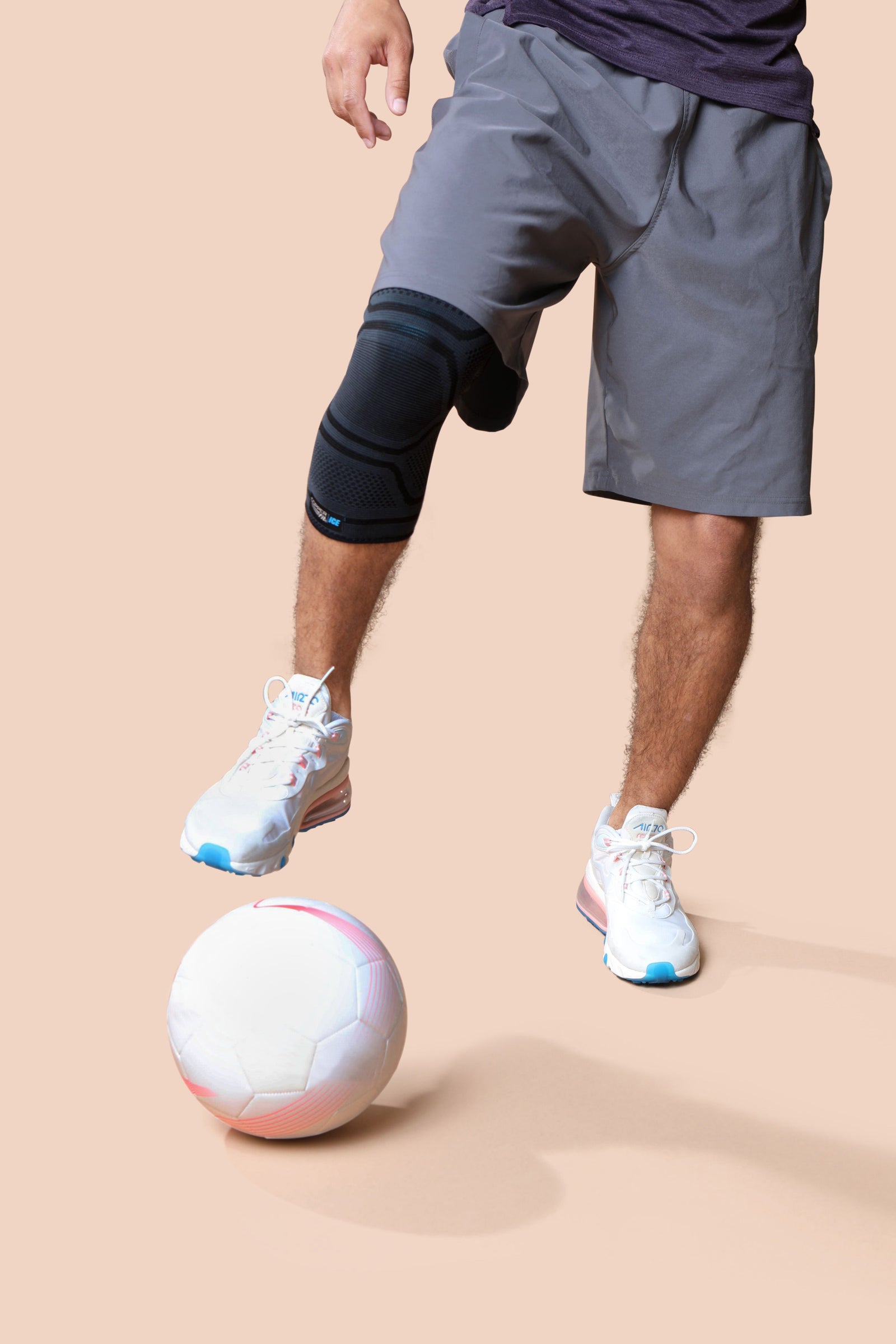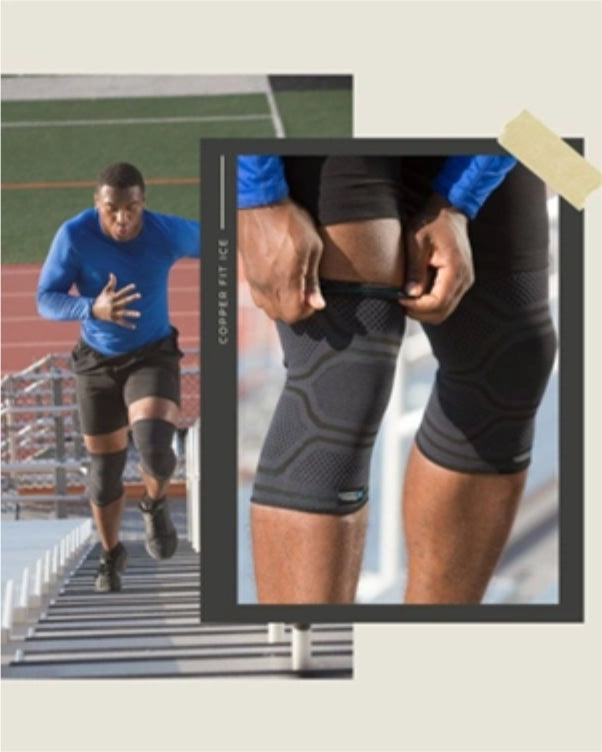
Neuropathy is a term that has caught the attention of many, especially those who have experienced its often discomforting symptoms firsthand. At its core, neuropathy results from nerve damage, leading to symptoms that can affect one's daily life. The root causes of this condition vary widely, from systemic diseases to traumatic injuries.
As people seek relief and ways to manage the discomfort and tension that neuropathy can bring, they often explore a variety of remedies. One such tool that has gained traction is the use of compression socks.
These specialized socks, known for supporting healthy blood flow and muscle relaxation, have been recognized as potential aids for those dealing with the symptoms of neuropathy.
What Is Neuropathy?
Neuropathy, in its simplest definition, is damage or dysfunction of one or more peripheral nerves, resulting in numbness, tingling, muscle weakness, and discomfort in the affected area. Our body's nervous system is divided into two main parts: the central nervous system (comprising the brain and spinal cord) and the peripheral nervous system (which connects the central nervous system to the rest of the body).
It's this peripheral system that neuropathy predominantly affects. When these peripheral nerves are damaged or don't function properly, they can send incorrect signals to other parts of the body or cease to transmit information altogether. This malfunction is what leads to the symptoms many experience.
Symptoms of neuropathy can be diverse. They often begin as a tingling sensation in the extremities, followed by a gradual numbness. For some, these sensations can escalate to discomfort or even nerve pain.
Others might experience muscle weakness or coordination challenges. These symptoms can make daily tasks like walking or holding objects increasingly difficult. The severity and range of symptoms largely depend on which nerves are affected and the extent of the damage to those peripheral nerves.
What Can Cause Neuropathy?
The root causes of neuropathy are vast and varied. Systemic diseases, those that affect the entire body, are among the most common culprits. Diabetes, for example, is one of the leading causes of peripheral neuropathy in the world. Prolonged elevated blood sugar levels can cause nerve damage, leading to diabetic neuropathy.
Traumatic injuries, from accidents to simple falls, can directly harm peripheral nerves, leading to acute neuropathic symptoms. Infections and viruses, like Lyme disease or shingles, can also result in neuropathy as they affect nerve tissues. Additionally, certain medications and toxins can contribute to nerve damage.
In some cases, however, the cause of neuropathy may remain unknown. This is called idiopathic neuropathy. Regardless of the cause, it's essential to approach neuropathy with a solutions-oriented mindset, seeking the best ways to manage symptoms and maintain an active, fulfilling life.
Does Neuropathy Go Away?
Neuropathy, with its varied origins, often prompts the question: Can it be reversed, or will it eventually go away? Because neuropathy can arise from an array of causes, its trajectory and outcome can differ greatly from one individual to another.
In some scenarios, neuropathy is temporary. For instance, neuropathy stemming from a particular medication might recede once that medication is discontinued.
Similarly, if it's a result of specific vitamin deficiencies, supplementing those vitamins could potentially reverse the symptoms. On the other hand, if neuropathy arises from long-standing conditions like diabetes, its permanence might be more pronounced.
The pivotal factor here is the root cause. Identifying and addressing the underlying cause can play a significant role in the trajectory of neuropathy. Consequently, it's of utmost importance for individuals to consult with healthcare professionals.
By understanding the unique aspects of one's neuropathy, a personalized, solutions-oriented plan can be formulated.
Tips To Soothe Discomfort Related to Neuropathy
While the journey with neuropathy may be tough at times, it's important to remember several supportive techniques can help manage the discomfort and tension that often come with it.
By understanding and implementing these methods, one can find some relief and continue to lead an active and fulfilling life.
1. Compression Socks
Compression socks act as a snug-fitting embrace for your feet and legs. These socks work by applying gentle pressure, especially at the ankles, and gradually decreasing that pressure as they extend up the leg.
This design supports healthy blood flow, countering the force of gravity. Healthy circulation can help soothe symptoms of soreness and tension, especially in the feet and legs, which are common areas affected by neuropathy.
2. Regular Exercise
Staying active is pivotal for maintaining robust circulation. Engaging in low-impact exercises like walking or swimming ensures that your muscles are working and blood is flowing efficiently.
Regular movement can not only support healthy blood flow but also help in releasing endorphins, the body's natural painkillers. For someone with neuropathy, starting with short, consistent bouts of activity can make a difference.
3. Warm Baths
The soothing warmth of a bath can be more than just a relaxing experience. Warm water helps dilate blood vessels, promoting better circulation.
This increased blood flow can assist in muscle relaxation and provide relief from the discomfort associated with neuropathy. Incorporating Epsom salts into the bath can further promote relaxation and soothe tension.
4. Massage
The therapeutic touch of a massage, especially on the feet and legs, can be a boon for neuropathy sufferers. Gentle massages can stimulate nerves, increase circulation, and alleviate tension. Regular foot and leg massages, even if done at home, can help soothe the discomfort and improve overall well-being.
5. Avoid Tobacco
Tobacco, particularly smoking, has numerous adverse effects on the body. One of its lesser-known impacts is the constriction and damage of blood vessels, leading to reduced blood flow.
For individuals with neuropathy, it's especially important to maintain optimal circulation. Avoiding tobacco can prevent further reduction in blood flow, making it beneficial for those looking to manage neuropathic discomfort.
6. Limit Alcohol
Alcohol in moderation might be alright for some, but excessive consumption can exacerbate neuropathy symptoms. Alcohol can have a neurotoxic effect, potentially damaging the nerves. Additionally, it can impair the liver's ability to process certain vitamins that are essential for nerve health. Keeping alcohol consumption in check is crucial for those with neuropathy.
7. Elevate Feet
Sometimes, simple actions can provide notable relief. Elevating the feet, especially after a long day, can help reduce swelling and discomfort. By lifting the feet above heart level, gravity assists in draining excess fluid, improving circulation and reducing tension in the affected areas.
Incorporating these supportive methods can be immensely beneficial. However, it's paramount to remember that these are ways to assist what the body naturally strives for and not definitive treatments. Always align with a healthcare provider to ensure you take the best approach tailored to your unique situation.
How Does Compression Technology Work?
At the heart of compression technology lies a simple yet profound science: applying gentle pressure to support blood flow. The circulatory system plays an integral role in ensuring that every part of the body, down to the toes, receives nourishing blood. This blood flow becomes even more crucial when nerve-related discomfort, like that from neuropathy, comes into play.
Compression socks, for instance, are designed in a gradient manner, meaning they are tighter at the ankles and gradually become less constrictive as they move up the leg. This design helps push blood upwards, combating gravity and ensuring an efficient return of blood to the heart.
Healthy circulation can be beneficial in soothing discomfort associated with these symptoms. When our circulatory system functions optimally, it supports the efficient delivery of oxygen and nutrients to various body parts, including nerve tissues.
While compression technology offers a supportive role in managing discomfort, it's not a cure. It's a way to stand side by side with your body's natural processes, helping to reinforce what it naturally aims to achieve: well-being and comfort.
The Bottom Line
Navigating the challenges of neuropathy requires strength, perseverance, and the right support. Understanding the condition and implementing supportive techniques can make a significant difference in daily life.
If you're seeking solutions to soothe the discomfort associated with neuropathy, remember you're not alone in this journey.
At Copper Fit, we understand the cycle of soreness, tension, and the longing for relief. While we've delved into several supportive methods, our compression technology is a beacon for those seeking to enhance their performance and recovery journey.
Sources:
Peripheral Neuropathy | Johns Hopkins Medicine





